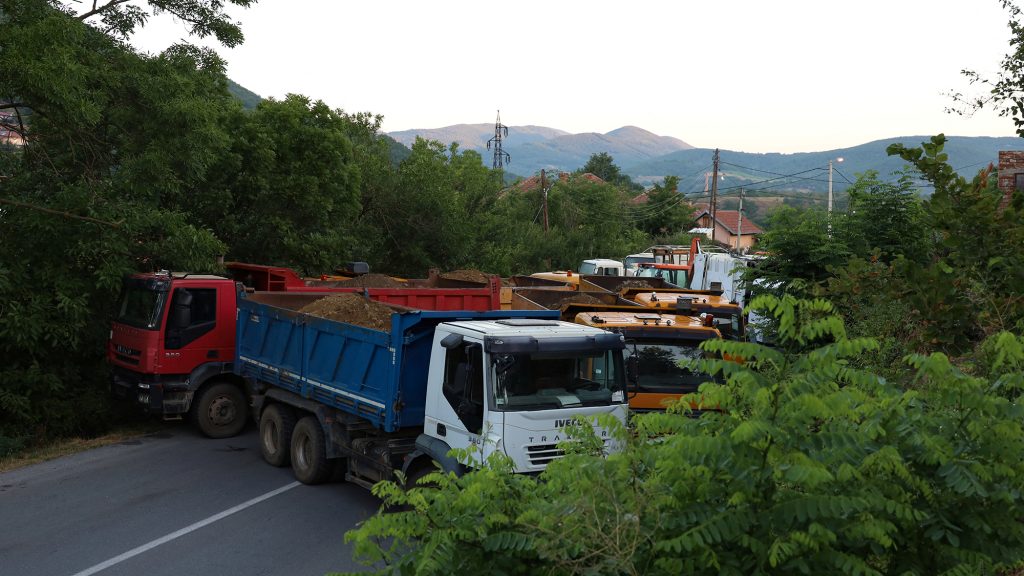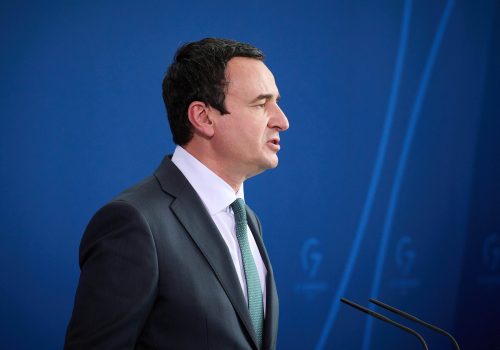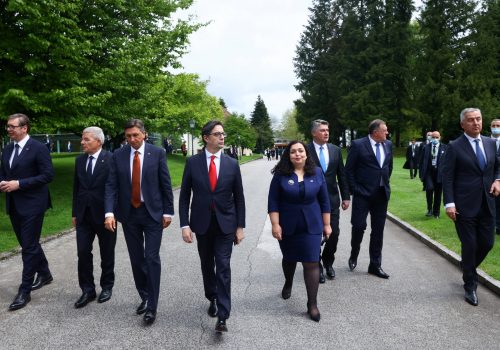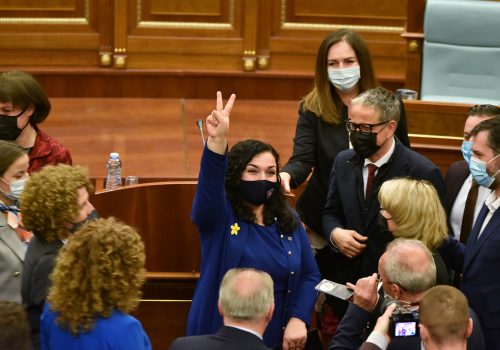In recent weeks, my country has promoted itself as a culturally vibrant destination for curious visitors. But on Sunday, Kosovo landed in global headlines for a much more unfortunate reason: A border flare-up between local Serbs and Kosovars in the north appeared to risk escalating into an open conflict.
For Western governments already jittery over the Kremlin’s war in Ukraine, fresh Balkan violence was the last thing they needed. Through quick-action diplomacy, they seemed to have averted the worst—but shouldn’t keep their eyes off what could still grow into a serious issue.
The fact that a spat over official documentation—requiring local Serbs to obtain Kosovan IDs and car registrations—sparked such tensions is a testament to the fragility of the situation.
The issue has been discussed for more than a decade as part of the ongoing dialogue facilitated by the European Union (EU). Moreover, the recent decision by the Kosovo government to require new documentation was fully reciprocal to what the Serbian government has been doing to Kosovars for fifteen years. But as the deadline for the implementation of these decisions loomed Sunday, Russia-friendly Serbian President Aleksandar Vučić and his allies—backed up by state media—accused Kosovars of preparing attacks on the north and hunting Serbs.
Things quickly began spiraling out of control. As local Serbian militants erected barricades with heavy machinery and trucks, Kosovan police and NATO troops reinforced their positions at the border crossings. Officials confirmed shootings and attacks against police and Albanian civilians. Serbia’s interior minister has even been spotted wearing the notorious “Z” insignia synonymous with Russia’s invasion of Ukraine. Journalists, experts, and Ukrainian lawmakers scrambled to react to what appeared to be an attempt by Belgrade to purposely inflame tensions. That fear was not baseless: For months, Western officials and Balkan leaders have worried that the region might become fertile ground for Russian meddling.
In the end, both the EU and United States pressured Kosovo to postpone the “reciprocity decision” for a month. But while an immediate crisis was averted, a lasting solution has not been found. In the medium to long term, it’s clear that something must immediately change in the dialogue between Kosovo and Serbia, which is facilitated by the EU but also supported by the United States. US Assistant Secretary of State for European and Eurasian Affairs Karen Donfried recently stated: “The status quo is unsustainable; not only does it hinder Kosovo and Serbia’s European futures, but it benefits the Kremlin.”
Kosovo can’t expect recognition by the remaining five EU countries that don’t recognize its statehood without a comprehensive normalization of relations with Serbia. Spain, for one, has already indicated this would unlock its recognition—which would in turn allow for Kosovo to become a signatory of the Partnership for Peace and pave the way for its eventual membership in NATO (which Washington supports). Bringing investments, tourism, and much-needed integration into the Council of Europe, NATO, and other bodies where Russia does not have a veto is contingent on this normalization.
Meanwhile, Serbia must stop its belligerent actions toward Kosovo. Its media landscape, under full control of the government in Belgrade, has been spewing hate speech against my country for far too long. For their part, the EU and the United States must be more forceful in compelling Serbia to once and for all choose its geopolitical orientation rather than attempting to play both sides. There are some indications that this has already begun; but dancing around the thorniest problems in the Balkans won’t suffice to prevent crisis and bloodshed.
Brussels and Washington must change their formula of ineffective, last-minute shuttle diplomacy to solve crises. The pay-off—lasting peace in the Balkans—is far greater than the political capital needed to finally close this fractious chapter between Kosovo and Serbia.
Petrit Selimi is the former foreign minister of the Republic of Kosovo.
Further reading
Thu, May 19, 2022
Kosovo prime minister: Europe can help defend this ‘democratic success story’ amid Russian aggression
New Atlanticist By
Prime Minister Albin Kurti made the case for the power of the EU and addressed his country’s path forward with Serbia at an Atlantic Council Front Page event.
Tue, Nov 16, 2021
Kosovo and Serbia expose the Summit for Democracy’s conundrum
New Atlanticist By
The Biden administration's belated decision to invite both Western Balkan rivals, even though they are on different democratic trajectories, shows the inherent tension: Is this summit all about geopolitics or is it all about democratic values?
Tue, Jun 15, 2021
Kosovo President Osmani: Today’s challenges require ‘an entirely different governing mindset’
New Atlanticist By Katherine Walla
As Kosovo President Vjosa Osmani faces rule of law challenges, high unemployment rates, and a slow vaccine rollout, she’s putting domestic reforms at the top of her priorities—even ahead of the country’s European Union-facilitated dialogue with Serbia.
Image: A general view shows trucks blocking a road in Rudare, Kosovo on August 1, 2022. Photo via REUTERS/Fatos Bytyci.



